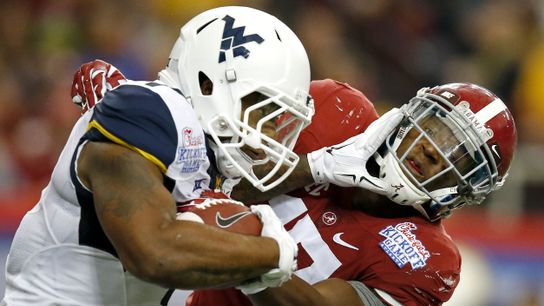Back in April, we wondered what might happen if Alabama moved forward with a fall season and Vanderbilt did not. The thinking then was that every league would attempt to play with whoever was ready and willing.
Four months later, we now know that was not how the cookie crumbled.
Six whole conferences are moving forward with a fall season (with the exception of C-USA member Old Dominion) while four are out entirely.
As August continues its slow crawl into September, the season is now days--not months, and not weeks--away, and it's beyond time to get stuff figured out.
What happens if a game gets canceled?
First, I'd advise everyone to do the rarest of activities in 2020: take a deep breath and calm down.
“If we are advised that it is OK to play the (football) season, we should all expect that there will be such disruptions,” Big 12 commissioner Bob Bowlsby said back in July.
Postponements have been baked into the plan from the very beginning.
Take the ACC schedule, for example. With the exception of Pitt, half the conference is off Sept. 26, and the other half is off Oct. 3. Every team has an additional off date in October or November, and the conference also gave itself the freedom to push its championship game back to Dec. 19 and use Dec. 12 as a makeup date.
The SEC and the Big 12 did much the same. As did the Big Ten and Pac-12 before they folded up the tent.


If you're looking for a roadmap here in these unprecedented times, look at Major League Baseball. The St. Louis Cardinals have played in just 18 games, while most everyone else in MLB is up around 30. Still, the season marches on, and the league fully expects to stage the World Series in October.
What will it take to cancel a game?
This is the proverbial million dollar question, and there's no hard-and-fast answer.
This type of stuff below is manageable enough in late August but will be a serious problem a month from now.
Note how Riley said a COVID test, singular, is what knocked out the aforementioned position group. Positive tests aren't necessarily the biggest obstacle to be overcome, NCAA-mandated contact tracing requirements are.
NC State, with its athletics activities paused, has already mused about moving its Sept. 12 opener against Virginia Tech back to Sept. 26.
What's the point of no return between when a team can play a game and when it can't? The only honest answer here is it depends. Depends on the player(s) affected by positive tests and/or quarantine requirements, the position groups and the coaches and/or administrators involved.
I've reached out to multiple conferences with the same line of questioning and have yet to hear back. (Update: The Big 12 tells me that process is still being developed.)
Both of those questions funnel into the ultimate query that will determine the fate of the 2020 season.
What is the institutional appetite to finish the season?
This is a question that no protocol can address.
We can safely determine the NFL and MLB, as purely professional enterprises, have tremendous appetites to get their non-bubbled seasons in.
College football, as we know, is not. This sport is subject to the winds of public pressure in ways that professional and even high school sports are not. There are just more cooks in the kitchen in college sports than anywhere else in American sports.
Just how determined are those cooks to block out the noise and play this season to its completion, or are they waiting for the next round of campus outbreaks and/or canceled games to shut down the kitchen until next year?
That's a question only time can answer.
